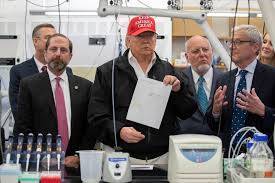The Erosion of Science in US Democracy: A Threat to Informed Decision-Making
The United States has long been a beacon of scientific excellence, with a strong tradition of investing in research and development. However, in recent years, the role of science in US democracy has come under threat. The erosion of science in US democracy is not just a concern for the scientific community, but also for the health of democracy itself.
The US has a long history of relying on science to inform policy decisions. From the Manhattan Project to the Apollo moon landings, science has played a critical role in shaping US policy and driving innovation. However, in recent years, there has been a growing trend of science being ignored, dismissed, or politicized.
One of the most striking examples of this trend is the Trump administration's approach to climate change. Despite the overwhelming scientific consensus that human activities are driving climate change, the Trump administration has repeatedly denied or downplayed the issue. This has had serious consequences, including the US withdrawal from the Paris Agreement and the rollback of climate-related regulations.
The erosion of science in US democracy is not limited to climate change. There has also been a growing trend of science being ignored or dismissed in areas such as public health, environmental protection, and education. For example, the Trump administration has repeatedly sought to cut funding for the National Institutes of Health, which is the primary source of funding for medical research in the US.
The consequences of the erosion of science in US democracy are far-reaching. Without access to accurate and reliable scientific information, policymakers are unable to make informed decisions. This can have serious consequences, including the implementation of policies that are not based on evidence and the failure to address pressing societal challenges.
Furthermore, the erosion of science in US democracy undermines the very foundations of democracy itself. Science is a critical component of democratic decision-making, as it provides a basis for evaluating evidence and making informed decisions. Without science, democracy is reduced to a mere popularity contest, where decisions are based on emotion and ideology rather than evidence and reason.
The erosion of science in US democracy is also having a profound impact on the scientific community itself. Many scientists are feeling increasingly frustrated and disillusioned with the lack of attention being paid to their research and expertise. This has led to a growing sense of disengagement and disillusionment among scientists, which could have serious consequences for the future of science in the US.
In order to address the erosion of science in US democracy, it is essential that policymakers and the public take a number of steps. First, policymakers must commit to using science as a basis for decision-making. This means seeking out and listening to the advice of scientific experts, rather than ignoring or dismissing their views.
Second, the public must demand that policymakers take science seriously. This means holding policymakers accountable for their actions and ensuring that they are using science to inform their decisions.
Finally, scientists themselves must take a more active role in engaging with policymakers and the public. This means communicating their research and expertise in a clear and accessible way, and being willing to speak out on issues of public concern.
In conclusion, the erosion of science in US democracy is a serious concern that has far-reaching consequences for the health of democracy itself. In order to address this issue, it is essential that policymakers, the public, and scientists themselves take a number of steps to ensure that science is used as a basis for decision-making. Only by working together can we restore the role of science in US democracy and ensure that policymakers are making informed decisions based on evidence and reason.




No comments yet
Be the first to share your thoughts!